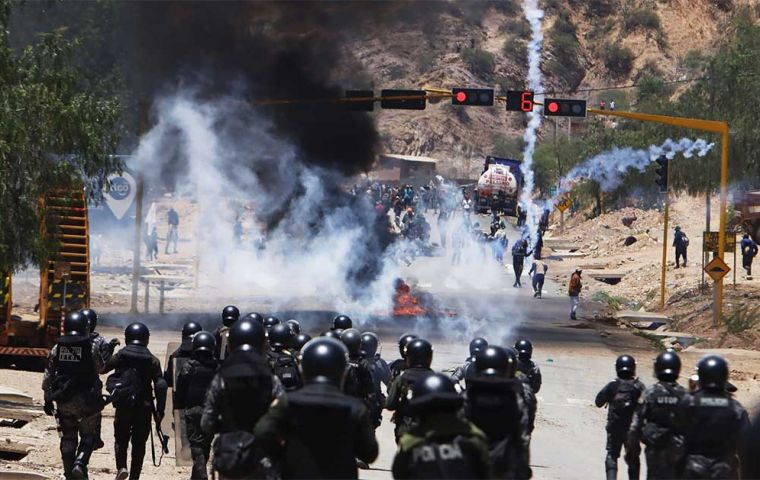MercoPress. South Atlantic News Agency
Bolivian gov't announces countermeasures to Evistas
 So far 91 policemen have been injured in clashes with the Evistas
So far 91 policemen have been injured in clashes with the Evistas Bolivian authorities announced Sunday that they would be launching “Operation Recovering the Homeland” after followers of former President Evo Morales seized three military barracks last week, keeping some 200 troops hostage.
The rebels perpetrated these acts in retaliation after law enforcement forces pierced through some of their road blockades in Parotani.
According to a statement, Bolivia's Defense Ministry “strongly condemns the armed and violent seizure of military units in the Tropic of Cochabamba.”
“These acts objectively constitute serious crimes against democracy, the security and stability of the State, the life and integrity of military and civilian personnel and their families,” the document went on. The Bolivian Government also pledged to hold those responsible for these acts accountable before local and international courts of law. “All Bolivians are aware that those responsible for these criminal acts must assume their consequences,” the declaration went on.
On Sunday, Government (Interior) Minister Eduardo del Castillo said on X “that normality returns little by little in Parotani” and guaranteed that the rest of the roads would be unblocked in the coming days. He also explained that so far 91 policemen have been injured in clashes with the Evistas.
It was also reported Sunday that the road blockades have resulted in huge losses: ”The agricultural sector has lost US$ 88 million per day, the oil industry 14(...), the sugar sector 6 million, alcohol 4 million, poultry 4.7 million, pork 2 million, beef 7.1 million, textiles 12.5 million, restaurants and hotels 7 million, that is to say, the losses are substantial,“ Deputy Domestic Trade Minister Grover Lacoa pointed out.
Lacoa also warned that the damages would go beyond the current harvest because inputs would not arrive for the next planting season. ”We were preparing for the planting campaign,“ reported Lacoa, ”and it is being affected because, evidently, the blockades have impeded the flow of diesel, gasoline, inputs, seeds, and others,“ he mentioned. He also underscored that the Cochabamba area, where the crisis is developing, is a national and international trade hub. Among the exports affected were shipments of bananas to Argentina.
The official also admitted that ”baby chickens“ were not taken to the production and fattening centers. He also mentioned problems with corn and sorghum, as well as an overproduction problem of soybean meal, thus pushing prices downward.
Speaking alongside Lacoa, Deputy Autonomy Minister Álvaro Ruiz noted that the crisis would impact municipalities receiving a smaller tax co-participation. ”If there is no transport, commerce decreases its co-participation,” he warned.




Top Comments
Disclaimer & comment rulesCommenting for this story is now closed.
If you have a Facebook account, become a fan and comment on our Facebook Page!